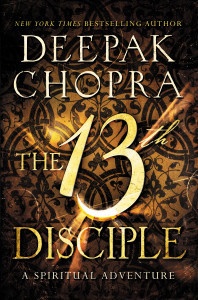By Deepak Chopra, MD
The worldview of modern physics teases us with spiritual suggestions like the discovery—premature it seems—of the “God particle.” That nickname embarrasses some in the field, but ever since Fritjof Capra’s book The Tao of Physics, the links between Eastern spiritual traditions and the findings of quantum physics have been tantalizing.
Now they are much more than that. In three previous posts I’ve argued that synchronicity, the experience of a meaningful coincidence, points toward a new way of life, one where the strange and spooky behavior of the quantum domain can be used to change our view of everyday reality. There is a staunch band of physicists and their skeptic hangers-on who erect a brick wall between the quantum and classical domains, but more and more they are in the minority.
This is because we exist in only one reality, not two. Nature didn’t separate the quantum and classical worlds; this division exists in the mathematical models of physics. If you keep normal, everyday life on one plane and quantum behavior on another, a bridge must eventually be built. In everyday life, as human beings live it, there is intelligence, meaning, purpose, intention, creativity, evolution, and consciousness. To date, no one has constructed a plausible way for these things to arise out of the random, mindless, meaningless operation of subatomic particles.
This matters. Instead of trying to keep the brick wall intact, more scientists are looking at the common ground between the classical and quantum worlds. Their purpose isn’t to make everyday life quantum, nor is mine. The sensible goal is to explore how common principles uphold reality as a whole.
One principle is self-organization, which applies to the atom and to the human body. Both are self-sustaining systems that use feedback loops to remain in balance. Another principle is qualia, the qualities we experience through the five senses and the mind. Qualia aren’t about numbers; they are about how reality is experienced. The color red is a qualia; its wavelength is a number. Middle C on a piano is a qualia; it also has a measurable wavelength. Qualia define every moment of human existence, but science has resisted the concept, preferring numerical measurement. But numbers will never get you to intrinsic qualities that are imbedded in reality, such as beauty, truth, harmony, goodness, and love.
The common ground here, as a number of thinkers agree, is mathematics, which displays harmony, order, balance, and even beauty, not as add-ons or psychological projections but as fundamental properties of math itself. This realization opens the door for other qualia in other parts of science, particularly harmony and balance, which all self-organizing systems display.
The next common principle is creativity. At the quantum level, genesis is a constant as new subatomic particles bubble up from the so-called quantum foam. It hardly seems an accident that creativity is a constant in the classical world as well. The brain of a skeptic is creating new neurons and pathways throughout life, even if they are being used to deny the principle of creativity, espousing that only random events give rise to new creations in nature. No one has successfully rebutted the clever remark by physicist Fred Hoyle that creating DNA out of random events is the equivalent of a hurricane blowing through a junk yard and creating a Boeing 727.
The relevance of these three common principles—self-organization, qualia, and creativity—is hard to overestimate. If they take hold on a wider scale, our view of the cosmos will never be the same. We will look out on a universe where human beings belong at home rather than a cold, alien vacuum. The vacuum isn’t habitable, but that’s not the point. The point is that reality itself is human, created through experience, upheld by the same core values. Such a view has been dismissed as Platonic, poetic, or blindly anthropomorphic. But that’s starting to change.
The reason for the rise of Platonism in a new, scientifically valid guise is that without common values, reality is either hostile to human beings or indifferent to us. It seems untenable that this can be true, because here we are, the product, as the famous astronomer Sir Arthur Eddington remarked of “something unknown . . . doing we don’t know what.” That something can be relied upon, however. The principles of self-organization, qualia, and creativity are at the heart of human life and of Nature itself.
Deepak Chopra, MD is the author of more than 80 books with twenty-two New York Times bestsellers. He serves as the founder of The Chopra Foundation and co-founder of The Chopra Center for Wellbeing. His latest book is The 13th Disciple: A Spiritual Adventure.

